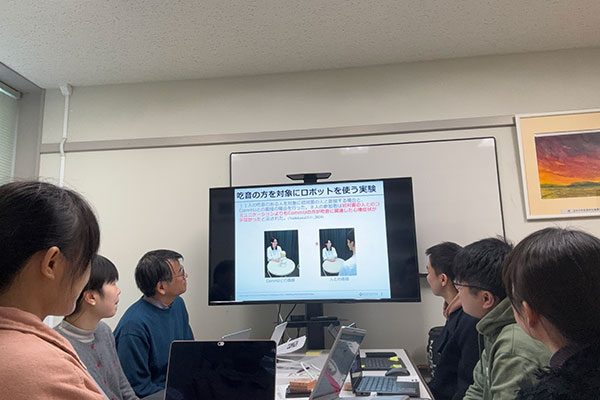Educational Support Development Course
Overview
In response to requests from schools, which aim to plan classes and events that reflect the region’s characteristics, this course seeks to educate and develop individuals capable of providing professional educational support to bring schools together as teams, such as education producers and coordinators.
Research Field of the Academic Staff
| Programs/Courses Special Subjects | Name | Research Fields | |
|---|---|---|---|
| Psychosomatic health research | KOBAYASHI Hiroaki | [Language Disabilities] Special Support for Education | kobah@staff. |
| YOSHIMURA Yuko | [Developmental Disabilities] Developmental Disabilities, Brain Science, Special Support for Education | yukuchen@staff. | |
| Educational support research | ITOH Shinya | [Mathematics Education] Pedagogy, Subject Pedagogy, Science Education | itoh@staff. |
| UEMORI Sakura | [Life Guidance] Education Methodology | uemori@staff. | |
| ORIKAWA Tsukasa | [Japanese Language Education] Subject Pedagogy | orikawa@ed. | |
| DOI Taeko | [Environmental Education] Curriculum Theory | tdoi@ed. | |
| Modern education and society research | TSUCHIYA Akihiro | [Educational Administration] Educational Law, Educational Administration, Basic Law | aktsuchi@staff. |
| TORII Kazuyo | [History of Education] History of Education | torika@ed. | |
| Family life research | OJIMA Kyoko■ | [Consumer Lifestyle] General Home Economics and Life Science | ojima@ed. |
| TAKIGUCHI Keiko | [Childcare] Developmental Psychology, Early Childhood Care and Education, Special Support for Education | ktaki@staff. | |
| HANAWA Yuki | [Life and Community] Local, Community Learning, Children’s Town, Mini-Munich, Residential Education | hanawa@staff. | |
| MORISHIMA Mika | [Clothing and Living] Clothing, Housing, and Lifestyle Studies | morishimam@staff. | |
| WATAHIKI Tomoko | [Home Economics Pedagogy] Subject Pedagogy | watahiki@ed. | |
| Art planning research | IKEGAMI Takayuki | [Environmental Art Design] Design | ikegami@ed. |
| ETOH Nozomu | [Sculpture of Regional Art] Sculpture Theory, Statue Making, Three-dimensional Sculpture | etoh@ed. | |
| OMURA Masaaki■ | [Regional Art and Sculpture] Painting Theory, Painting Techniques and Materials | moomura@ed. | |
| WASHIYAMA Yasushi ★ | [Regional Crafts and Architecture] Textbook Pedagogy, History of Architecture and Design, History of Metal Crafts and Crafts | washi@ed. | |
| Concert planning research | ASAI Akiko | [Artistic Expression Composition and Arranging] Composition and Contemporary Music, Creative Education | akikoasai@ed. |
| ANDO Joko | [Artistic Expression Vocal Music] Song, Chorus, Breath, Performance, Heart | joko-an6@ed. | |
| NISHIJIMA Chihiro | [Arts Education] Music Education, History of Music Education, Musicking | chihiro-pp@staff. | |
| Sports coaching research | KIMURA Takahiro | [Exercise Neuroscience] Exercise Science, Neurophysiology, Sports Science | kimura@staff. |
| NONAKA Yudai | [Sports Nutrition] Diabetes, Exercise, Weight Loss, Pancreas, Tendon Atrophy | ynonaka@staff. | |
| MURAYAMA Takayuki | [Physical Exercise Psychology] Sport Psychology, Experimental Psychology, Cognitive Behavioral Science | tmura@staff. | |
| YAMADA Tetsu | [Biomechanics] Sports Biomechanics | te2yamada@staff. | |
| YOKOYAMA Takeshi | [Sports Pedagogy] Body Pedagogy | tyokoyama@staff. |
- Note 1: Transfer in Mar 2026 ☆: Mar 2027 ★: Mar 2028 (Not selectable as preferred advisors. ★ only if enrolling in Oct 2026)
- Note 2: Those with ◎ on the right side of the name column cannot be Senior Supervisors because they were transferred in April 2025.
- Note 3: ◆ to the right of the name column indicates full-time faculty members of the Department of Regional Development Studies who accept graduate students under the short-term (one-year) enrollment program.
- Note 4: The information in square brackets([ ]) in the “Area of Specialization” column is the “Area of Specialization” of the relevant faculty member.
- Note 5: Please add “kanazawa-u.ac.jp” after the “E-mail” field.
Laboratory Introduction
I am researching a disorder of “speech fluency” called stuttering. There are various individuals involved in my research, including those who study the thoughts and challenges faced by people who stutter, as well as those working on the development of teaching and support methods for individuals who stutter. Generally speaking, the word “disability” tends to have a negative image, but there is not a single person around me who conducts research with a negative image of disability. I focused on “online job interviews,” which people with stuttering tend to find difficult. I conducted an experiment to explore a web conferencing system that would make speaking as easy as possible. Although it was challenging for me to acquire and create knowledge that was not found in textbooks, I feel that I grew significantly as a person.
Please visit our laboratory if you are interested in studying stuttering or other communication disorders. I am sure you will make discoveries and encounter new perspectives.
Course/Program Name
Course of Educational Support and Development
Name of Faculty Member
Hiroaki Kobayashi



